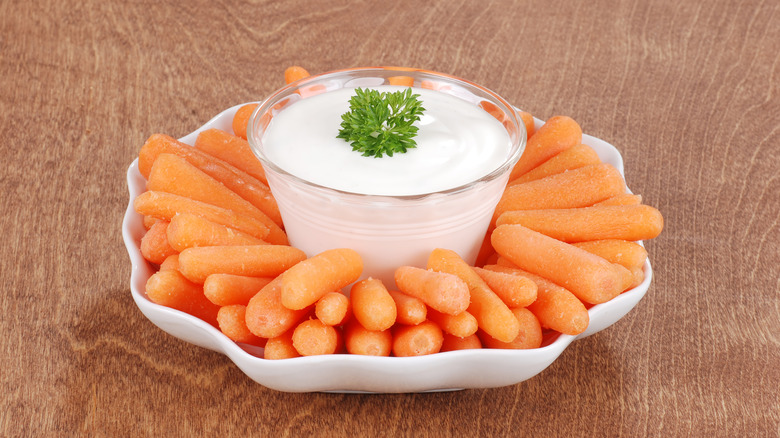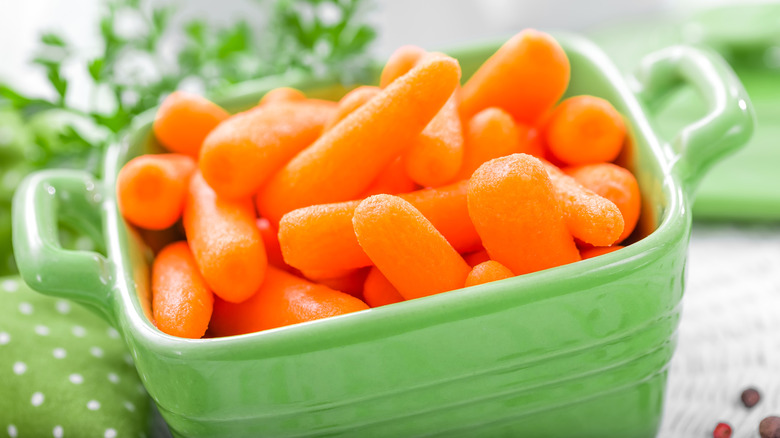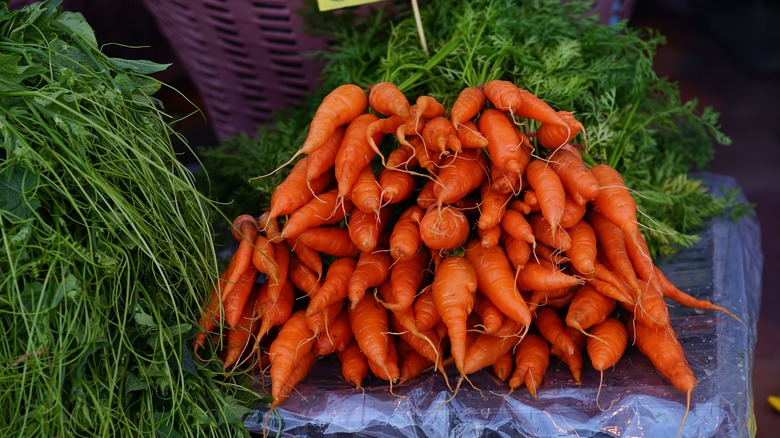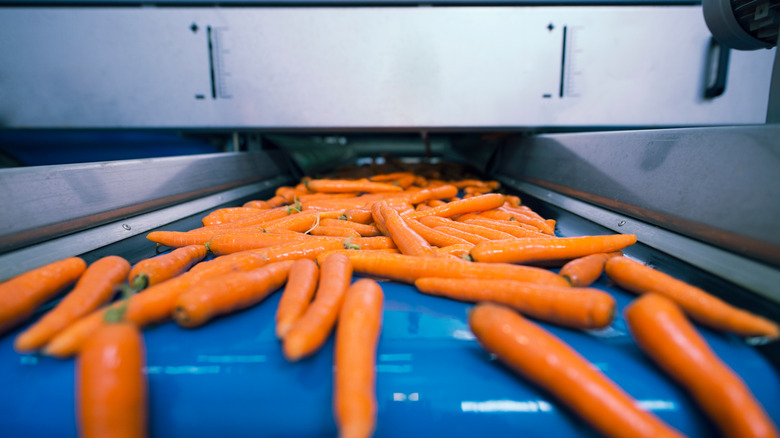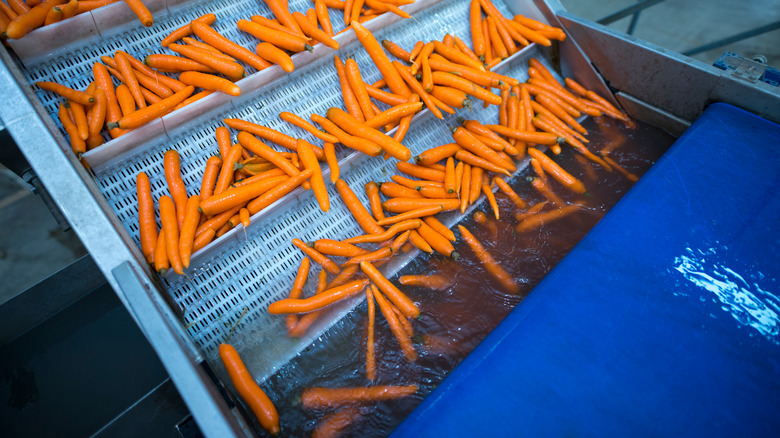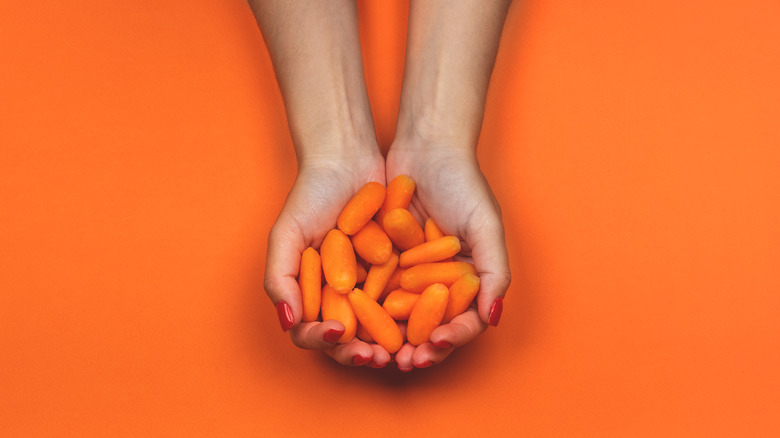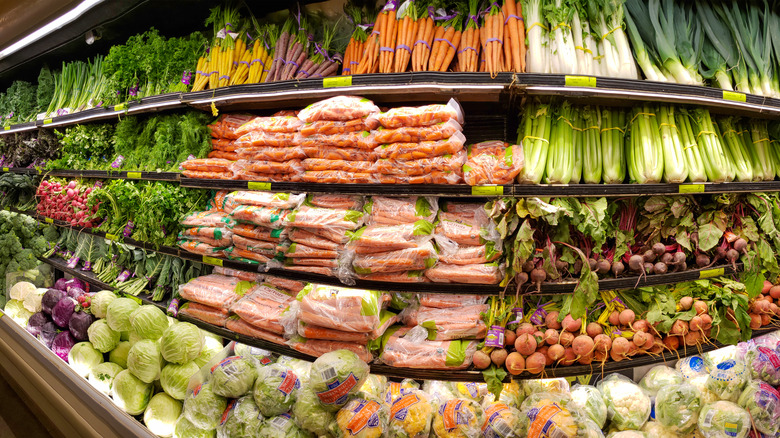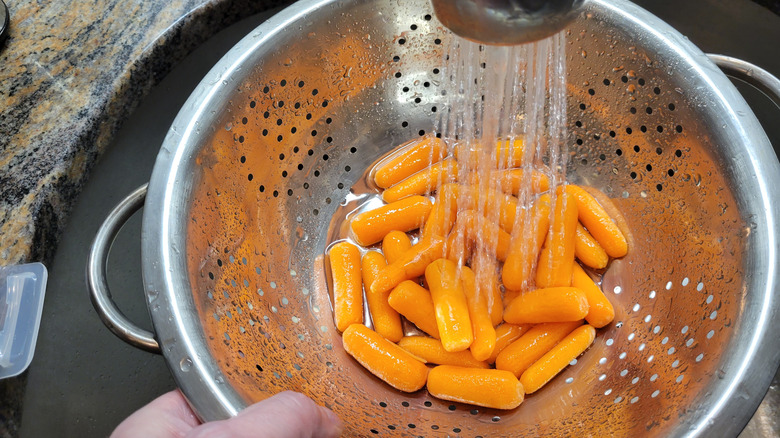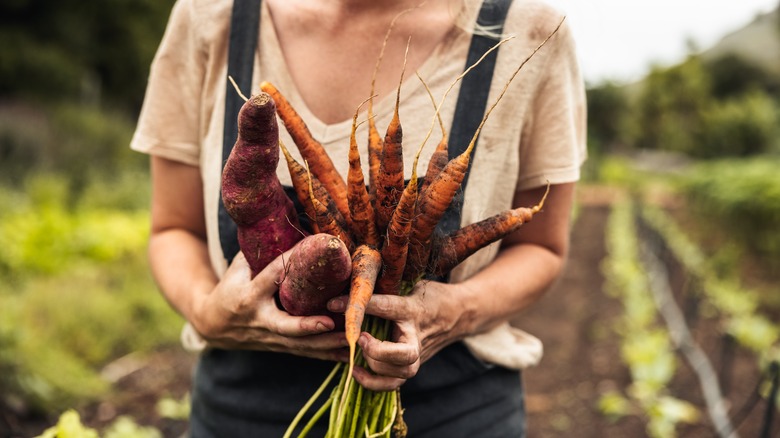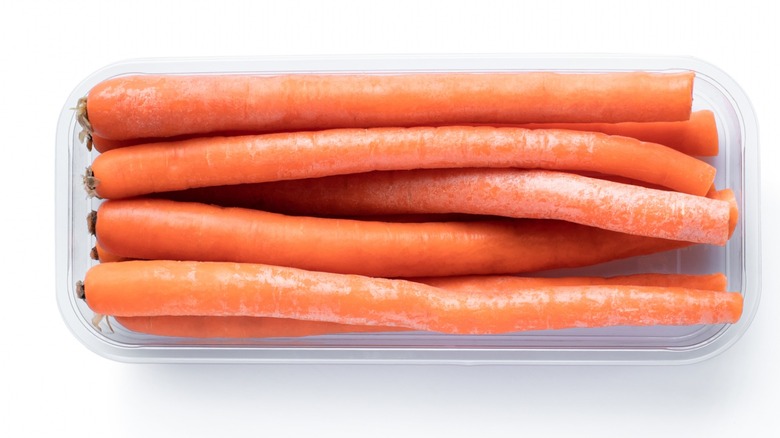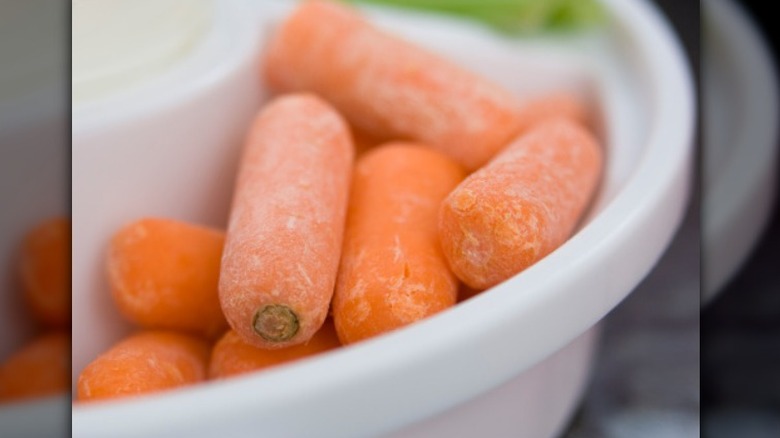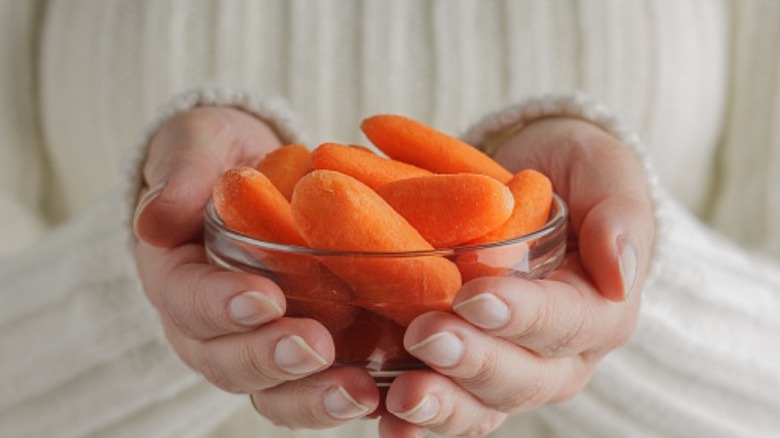Read This Before Eating Any More Baby Carrots
Whether you dip them in hummus or ranch, pack them in your purse or your kid's lunch box, or swap them out as a healthy alternative to potato chips, baby carrots are seemingly everywhere. They're a sweet, crunchy, and convenient grab-and-go snack that has utterly transformed the carrot industry.
After their invention in the early 1980s, baby carrots became a grocery store staple and sales boomed, to the point where baby carrot sales more than doubled sales of regular carrots in just a few short years. Nowadays, baby carrots account for roughly 70% of all carrots sold. And while the creation of baby carrots may have been somewhat of an experiment, their popularity was the result of nothing less than a genius marketing ploy. Meanwhile, though they're not as affordable as regular, disfigured carrots that are pulled straight from the ground and placed in the produce section of your grocery, they are far more convenient. Washed, peeled, and ready to snack on, they are packaged to look and feel like a bag of potato chips or candy — though with far superior health benefits.
Convenience and crunch aside, baby carrots have a mixed reputation full of misconceptions. Things like the dangers of chlorine rinses or the environmental waste that occurs during baby carrot production may not be all that you think in the world of baby carrots. Read on to learn more about this nutritious snack so you may make a more informed decision next time you're perusing the carrot section.
Whether baby or regular, carrots have many health benefits
Regardless of whether your carrots are baby or regular, roasted or raw, juiced or sautéed, the truth is that they are loaded with vitamins, minerals, and other nutrients that may help improve everything from your vision to your heart health. For starters, carrots contain high levels of beta-carotene, a provitamin that your body uses to make vitamin A, as per the University of Rochester Medical Center. Vitamin A is a bit of a big deal. According to Medical News Today, vitamin A deficiency is one of the leading causes of blindness in children that could otherwise be prevented. It's also been linked to night blindness and other difficulties seeing in dim light.
Given that they're also relatively low in fat and calories, and high in fiber, carrots are a healthy option for anyone seeking a good snack. The medley of vitamins and minerals in carrots — including potassium, biotin, and vitamins A, B, and K1 — may help lower blood pressure, improve the immune system, support bone health, and reduce the risk of certain types of cancers, as per Healthline. All in all, baby carrots and regular carrots alike present a serious win when it comes to supporting your health.
Baby carrots were invented in the 1980s
Baby carrots didn't come about by accident. Instead, they were created in the early 1980s to reduce the overwhelming waste of carrots. That's because suppliers and customers had collectively decided that many full-size carrots plucked from the ground were not visually appealing. Therefore, they were not selling, contributing to a lot of grocery store food waste. Mike Yurosek, a farmer from Kern County, California, was running one of the largest carrot operations in the state. At its height, his farm was producing upwards of 400 tons of supposedly disfigured carrots every day, alongside more visually appealing roots. Many of the misshapen carrots would not even fit into a standard-sized grocery store bag but were otherwise full of nutrients and safe to eat. Some were repurposed into animal feed or became carrot juice, but many were simply discarded.
Frustrated by the wasted carrots and lack of sales, Yurosek decided to use an industrial potato peeler and green bean cutter to reshape his carrots, making them all the same size and color. Yurosek's experiment worked, and his newly invented baby carrots eventually became all the grocery stores wanted to buy. Within a few years, carrot sales boomed, ultimately eliminating much of the waste caused by previously un-sellable carrots.
Baby carrots are more environmentally friendly than you'd think
Healthy, crunchy, and perfectly snack-sized, baby carrots were created out of a desire to reduce farmer food waste, as large and misshapen carrots weren't exactly flying off of grocery store shelves. Yet, misconceptions abound. Some sources still claim that baby carrots are made through a wasteful production process where they are peeled and reshaped by an industrial machine that leaves scraps for the trash can.
However, that's not quite the truth. The baby carrot manufacturing process has come a long way since the 1980s, and factories are now able to repurpose the scraps generated by cutting and peeling full-sized carrots into bite-sized portions. That waste is now often repurposed into cattle feed.
Some environmental enthusiasts may see baby carrots as a disconnect from our food system in general since they are only regular carrots that have been shaped to fit consumer and producer-led ideas of "pretty" produce. But aesthetics aside, baby carrots have not only caused the carrot industry to skyrocket; they've also revolutionized farming practices and brought much-needed attention to unnecessary grocery store food waste. Done right, baby carrots can be an environmental boon.
Baby carrots are safely rinsed with chlorine
There is a wealth of misinformation out there about baby carrots, both good and bad. One of the more alarming myths floating around maintains that baby carrots are soaked in bleach and then rinsed in cancer-causing toxic chemicals, such as chlorpropham. While baby carrots are indeed typically washed in an antibacterial chlorine rinse, that may not be as alarming as you initially think. Baby carrots certainly do not deserve the flack they receive from false claims stating that baby carrots are therefore unsafe for consumption.
First, the chlorine level found in baby carrot rinses is equivalent to the amount of chlorine found in most tap water in the United States. Utilizing a chlorine rinse is a common practice in fresh-cut fruits and vegetables, as Brimmway Farms vice president Dana Brennan told Reuters. That rinse is also used on foods that are grown in the ground, such as carrots, given that they're more prone to food-borne illnesses. Furthermore, as Cornell University associate professor Motoko Musai told Reuters, chlorpropham is not part of U.S. baby carrot production at all.
Furthermore, claims that baby carrots are soaked in bleach and other harmful chemicals to extend their shelf life are not accurate. The shelf life of most packaged carrots is three to four weeks, not the inaccurately reported seven to nine months, and they are not treated with the above chemicals for that purpose.
The baby carrot name is a misnomer
When you grab a bag of baby carrots and throw them in your grocery cart, do you ever think about how they're grown and produced? Most consumers nowadays are relatively disconnected from their food sources, especially when it comes to processed and prepackaged foods. While produce is pretty straightforward as far as ingredients go, baby carrots are largely misunderstood when it comes to farming practices and production.
That's largely because nearly all baby carrots aren't actually a type of carrot. Instead, they're simply a smaller, reshaped version of a regular, full-sized carrot that has been deemed too ugly for grocery store shelves on its own. In other words, baby carrots don't grow in the soil alongside their larger carrot parents as cute miniature versions that pop out of the ground looking ever-so perfect, orange, and crunchy. They're simply pieces of a larger carrot that has been peeled, cut, and rinsed. A better way to describe the baby carrot would be to call it a fresh-cut carrot, or even pre-peeled carrot bits. Still, many think the baby carrot title is better at rolling off the tongue
Baby carrots are more expensive than regular carrots
The most popular items at the grocery store are arguably the most convenient. Yet there's not a lot of convenience to be found in the produce section, with a few exceptions — including baby carrots. Upon their creation in the 1980s, they revolutionized the carrot industry by catapulting carrots from one of the lowest-selling produce items to one of the highest. But when you're buying a bag of baby carrots today, the reality is that you're paying for the convenience as much as you are for the product.
When compared to the price of regular carrot bunches that are not pre-bagged and sealed, baby carrots are far more expensive, often to the tune of double the price per pound. So, what's going on? The next time you're perusing the produce aisle, check the price of a five-pound bag of carrots. You'll find that you're probably spending the same amount on a 16-ounce bag of baby carrots. However, the carrots in bulk require rinsing, peeling, and cutting to your preferred size. Overall, regular carrots are more time-consuming, and therefore less appealing to the busy consumer.
Slimy or dried-out carrots can still be consumed safely
Keeping your baby carrots fresh is an important part of their appeal. No one wants to eat a dried-out, white baby carrot. Neither do you want a baby carrot with a slimy, slippery texture. But if you pull out your bag of baby carrots from the refrigerator and find either of the above situations, don't just toss those carrots away. That's because they're still safe to eat.
When carrots lose moisture, they start turning white. Baby carrots are more prone to moisture loss since they've already been peeled and don't have a protective outer layer to lock moisture in. Conversely, when baby carrot producers add water to the bag to maintain moisture, your baby carrots may take on a slimy, slippery texture. If this is offputting, simply rinse or blanch them to remove the film. Another option for dried-out or overly moist baby carrots is to ignore the problem and roast the carrots, which will mask those imperfections.
To avoid slimy or dried-out carrots in the first place, give your baby carrots a thorough rinse, then store them covered in water in an airtight container in the refrigerator. Don't forget to change the water every couple of days to deter bacterial growth. This method will also help to extend the shelf life of your carrots while maintaining their sweet flavor and crunchy texture for up to a month.
You can harvest any standard carrot as baby carrot
For the avid gardener looking to grow baby carrots, remember that there is no such thing. However, there's a silver lining: just about any variety of carrot can be reshaped into a baby carrot. In fact, processing regular carrots into baby carrots is a great way for the novice gardener to make use of stumpy, disfigured veggies that they wouldn't otherwise gift, sell, or consume themselves.
No matter the type of carrot you'd like to transform, start with healthy, moist soil that isn't too rocky or compressed, as that will stunt the carrot's growth. Varieties like Imperator carrots tend to grow long and skinny. They're also known for their sweetness, making them arguably the best type of produce to turn into baby carrots.
Other types of carrots that are often harvested to become baby carrots include scarlet nantes, lunar white, and little finger carrots. Harvesting them early — usually within 60 days — is the best way to make use of them for sweet and tender baby carrots.
Baby carrot sales are driven by a masterful marketing ploy
From the birth of the baby carrot in the 1980s to the conveniently snack-sized bags of baby carrots that line grocery store shelves today, baby carrot sales have always been the beneficiary of canny marketing.
If you label a food item as healthy (and particularly one that is grab-and-go), then chances are good that consumers will gravitate towards the opposite, especially when those people are kids and young adults. Once the convenience of a washed, peeled, and ready-to-consume bag of carrots caught on, marketing campaigns became all about packaging them to appeal to a wider audience of consumers. In a bid to attract younger shoppers, some marketing campaigns even leaned hard on the comparison to less-healthy snack foods, not to mention eye-catching ad spots drawing on the imagery of extreme sports.
Nowadays, bags of baby carrots can be purchased from school vending machines that place them alongside vending machine items that kids are more inclined to purchase, like potato chips and candy.
Most baby carrots are made from the Imperator variety of carrots
There are several different types of carrots, but when it comes to making baby carrots, one reigns supreme. Most baby carrots sold today are of the Imperator variety. Imperator carrots are the most widely sold type of carrot in the United States. These are the ones you are most likely to see on your local grocery store shelves.
The variety's high demand stems in large part due to its flavor. A high sugar content gives Imperator carrots a satisfyingly sweet flavor that makes them ideal for eating fresh. Several other characteristics contribute to their popularity, as well, including an eye-appealing, deep orange color; an easy-to-peel, thin layer of skin, and a storage life of up to one month.
These defining features alone would make Imperator carrots an excellent source choice for baby carrots. But there's another critical reason why this variety is used: its shape. Farmers typically grow Imperator carrots close to one another. These tight quarters prevent the carrots from growing wide, resulting in a long, thin root vegetable. This natural shape makes Imperator carrots much easier to whittle down to baby carrot size than other varieties.
The white stuff on baby carrots is carrot blush
If you've ever let an opened bag of baby carrots sit in the fridge for a few days, you've likely noticed some of the carrots have gained a white discoloration. Usually, such a change in appearance would be a strong indicator the food has gone bad. Fortunately, this is not the case with whiteish baby carrots.
"Carrot blush," as it is known, is merely a sign that the vegetable is dried out. "The white forms on baby carrots when they lose moisture and are exposed to the atmosphere," registered dietician Ilyse Schapiro told All Recipes. These blushing carrots are still perfectly fine to eat. In fact, you can get rid of the white film by simply giving the vegetables a rinse or dropping them in a bowl of water.
We know what you're thinking: If the white discoloration is a result of dehydration, why doesn't it happen to regular carrots? It all goes back to how baby carrots are produced. Carrots have a natural outer layer that helps retain moisture. Baby carrots are stripped of this protective layer during the process of cutting them down to size, thus leaving them susceptible to dehydration.
A single serving of baby carrots has just 30 calories
We know by now that despite their small size, baby carrots are packed with a significant number of nutrients. What they are not packed with, however, is a significant number of calories. In fact, you'll be hard-pressed to find a food carrying fewer calories.
According to the Department of Agriculture's FoodData Central, a single large baby carrot has just 5.25 calories. A whole serving of baby carrots has fewer than 30 calories. If these numbers don't prove it already, you get a clearer sense of just how healthy baby carrots are when you compare the bite-sized veggies to other popular snacks. For example, one ounce of potato chips (the standard serving size) contains 155 calories. A serving of Goldfish crackers comes packed with 125 calories, while one ounce of trail mix has more than 130.
Even other members of the produce family have more calories than baby carrots. A serving of broccoli contains 50 calories, a cup of sweet corn has 125, a medium-sized apple has nearly 100, while a banana has roughly 105. If you're looking for a diet-friendly bite to eat between meals, it's hard to go wrong with a bowl of baby carrots.
